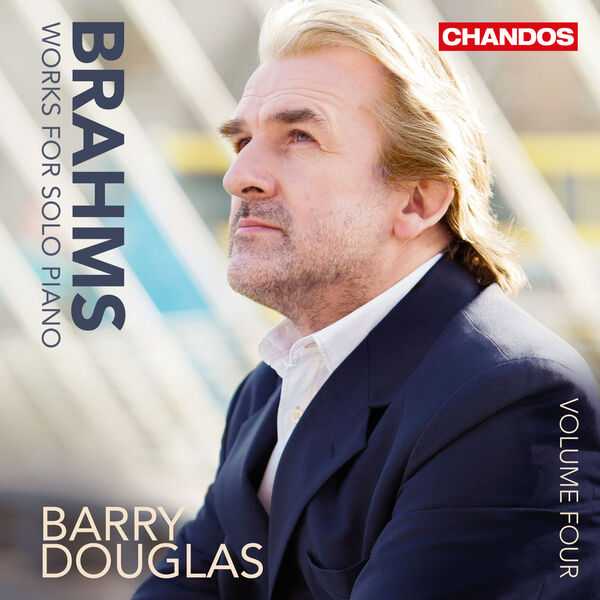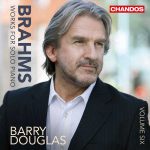

Composer: Johannes Brahms
Performer: Barry Douglas
Format: FLAC (tracks)
Label: Chandos
Catalogue: CHAN10857
Release: 2015
Size: 1.13 GB
Recovery: +3%
Scan: yes
Piano Sonata No. 1 in C major, Op. 1
01. I. Allegro – Poco ritenuto
02. II. Andante – Adagio
03. III. Scherzo. Allegro molto e con fuoco
04. IV. Finale. Allegro con fuoco
3 Intermezzi, Op. 117
05. No. 3 in C-Sharp Minor
4 Klavierstücke, Op. 119
06. No. 2, Intermezzo in E Minor
16 Variations on a Theme by Robert Schumann in F-Sharp Minor, Op. 9
07. Theme. Ziemlich langsam
08. Variation I
09. Variation II. Poco più moto
10. Variation III. Tempo di tema
11. Variation IV. Poco più moto
12. Variation V. Allegro capriccioso
13. Variation VI. Allegro
14. Variation VII. Andante
15. Variation VIII. Andante (non troppo lento)
16. Variation IX. Schnell
17. Variation X. Poco Adagio
18. Variation XI. Un poco più animato
19. Variation XII. Allegretto, poco scherzando – Presto
20. Variation XIII. Non troppo Presto
21. Variation XIV. Andante
22. Variation XV. Poco Adagio
23. Variation XVI.
8 Klavierstücke, Op. 76
24. No. 1, Capriccio in F-Sharp Minor
25. No. 2, Capriccio in B Minor
26. No. 6, Intermezzo in A Major
4 Ballades, Op. 10
27. No. 1 in D Minor, “Edward”
28 Variations on a Theme by Niccolò Paganini, Book I, Op. 35
28. Theme. Non troppo presto
29. Variation I
30. Variation II
31. Variation III
32. Variation IV
33. Variation V
34. Variation VI
35. Variation VII
36. Variation VIII
37. Variation IX
38. Variation X
39. Variation XI. Andante
40. Variation XII
41. Variation XIII
42. Variation XIV. Allegro
43. Variation XIV. Presto, ma non troppo
This is Volume 4 in Barry Douglas’s monumental project to record the complete works for solo piano by Johannes Brahms. Each volume has been released to critical acclaim, the first one, in 2012, being seen by BBC Music as ‘a triumph of Brahmsian thought, with playing that gets right to the heart of the composer’.
Once again, the album is presented as a stand-alone recital, prominently featuring the C major Sonata, which was Brahms’s first published work. The influence on Brahms of his early romantic predecessors Beethoven and Schubert is obvious here, not only in the virtuoso demands on the performer but also in the opening, which recalls both Beethoven’s ‘Hammerklavier’ Sonata, Op. 106 and Schubert’s ‘Wanderer’ Fantasy.
Two other works are much more than simple sets of variations. The Variations on a Theme by Robert Schumann highlight the close relationship of Brahms with Schumann and his wife, Clara, to whom the work is dedicated ‘with intimate reverence’, and demonstrate Brahms’s skill at ‘thematic actualisation’, whereby latent potentialities of a theme are gradually revealed throughout the variation process. In the Variations on a Theme by Niccolò Paganini – the first of two books originally published in 1866 as ‘Keyboard Studies’ – each variation explores a distinct figural pattern or keyboard technique.
The recording also features short keyboard character pieces, abundant in the second half of the nineteenth century and especially in Brahms’s later years.
The Chandos series of albums devoted to the solo piano music of Brahms, performed by Irish pianist Barry Douglas, here reaches its fourth volume. Douglas’ readings have been substantial and generally well received, and this group of pieces has the virtues of their predecessors in the series. Most notable is the structure of the program: Douglas plays Brahms’ smaller pieces not in their original opus-number groupings but as intermezzi between larger works. This makes sense on several different levels, one of them being that some of the short works here are indeed titled Intermezzi. It’s not at all clear that Brahms intended groups of short pieces to be plowed through from beginning to end. And, most important of all, the recital concept of Brahms’ time was oriented toward mixtures of weightier and smaller pieces. As in the earlier Douglas releases in the series, the pianist handles the mixture well. The overall dimensions are intimate, and the fervent, technically dense quality of the early Piano Sonata No. 1 in C major, Op. 1, comes through very nicely. Of course every note is in place in the two big variation sets that round out the program, but here some may miss a bit of hall-filling excitement. On balance this is a strong addition to Douglas’ series, although maybe not the one to start with for those just buying one. Among its virtues is the sound engineering from the West Road Concert Hall in Cambridge; it’s ideally suited to both performer and concept.



